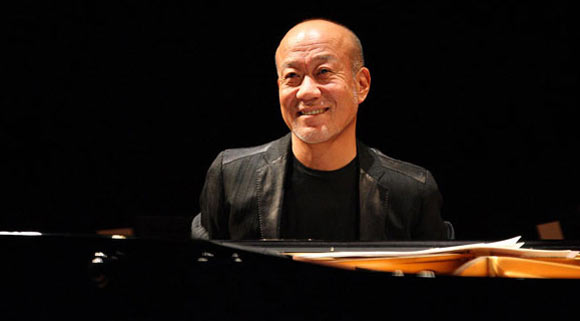
Joe Hisaishi is a Japanese composer and musical director, known for his eminent film scores for world famous directors.
Hisaishi was born as Mamoru Fujisawa, on December 6, 1950 in Nakano, Japan. At the age of five, he started taking violin lessons, at which he made rapid progress. At the age of nineteen, Hisaishi enrolled at the Kunitachi College of Music, where he majored in composition. He then started working as a typesetter for ‘minimalist’ music, where he gained valuable experience in the works of the ‘New York Hypnotic School’.
In 1974, Hisaishi’s career gained speed after a composition that he wrote for an animation movie titled “Gyatoruzu” earned widespread praise and acclaim. Hisaishi’s other works during this time included composition for “Tekuno porisu 21C” and “Sasuraiger”.
In 1981, Hisaishi released his first album titled “MKWAJU” and his second album, titled “Information” in 1982. It was also in 1982 that he adopted the stage name “Joe Hisaishi”, inspired by the legendary record producer Quincy Delight Jones. Then, in 1983, Hisaishi met film director Hayao Miyazaki. Miyazaki was greatly impressed by Hisaishi’s “Information” and “MKWAJU” and he asked Hisaishi to compose for his future films. Hisaishi’s collaboration with Miyazaki would help him achieve great fame, Hisaishi wrote the scores for “Laputa: Castle in the Sky” in 1986, “Porco Rosso” and “Princess Mononoke”. Hisaishi’s works between 1980 and 1988 included scores for “Mobile Suit Gundam Movie II: Soldiers of Sorrow”, “Mobile Suit Gundam III: Encounters in Space”, “Arion”, “Robot Carnival”, “Crest of the Royal Family”, and “Totoro”. In 1983, he also wrote the score to the highly popular science fiction television series titled “Mospeada”, which went on to be used by Carl Macek for “Robotech”. Two of Hisaishi’s greatest works were also composed in the 1980’s, these included scores for “Sasuga no Sarutobi” and “Futari Taka”.
Hisaishi is also highly reputed for his scores for anime productions. He has been credited for theme songs for highly popular productions, including “Hello! Sandybell” in 1981, “Maho Shojo Lalabel” in 1980, “Ai Shite Knight” in 1983, “Creamy Mami, the Magic Angel” in 1984, and “Kimagure Orange Road: The Movie” in 1988. These also included Hisaishi’s collaborative works with Hayao Miyazaki, for whom he also composed scores for “Nausicaa of the Valley of the Wind” in 1984, “Kiki’s Delivery Service” in 1989, “Spirited Away” in 2001, “Howl’s Moving Castle” in 2004, and “Ponyo” in 2008. According to BBC, Hisaishi also received training in anime compositions from renowned anime composer Takeo Watanabe, who was extremely famous for composing the scores to “Cutie Honey” and “Lone Wolf and Cub”.
Hisaishi went on to create his own recording label, which he titled “Wonder Land Inc”. He was then honored with being commissioned to write the soundtrack for the 1998 Winter Paralympics. Hisaishi’s solo career was also very promising as in 2004, he went on a piano tour with Canadian Musicians. In 2006, he released another studio album titled “Asian X.T.C”.
Hisaishi also wrote the score for “Departures”, a film that won the Academy Award for the Best Foreign Language Film. Joe Hisaishi himself has been highly decorated for his works. He received the Medal of Honor with purple ribbon by the Japanese Government in 2009. He is also a six time winner of the Japanese Academy Award for Best Music, which he last won in 2011.